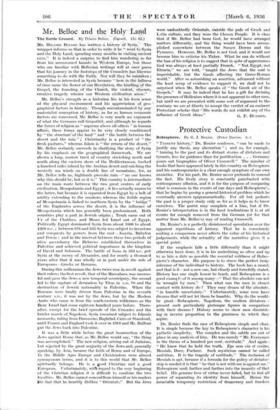Mr. Belloc and the Holy - Land Ma. HILAIRE BELLOC has
written a history of Syria. The wrapper informs us that in order to write it he `!. Nyent.to Syria and the Holy band, spending many months in visiting ancient sites." It is indeed a'surprise to find him' wandering so far from his accustomed haunts in' Western gurope, but those who are familiar with lielloCian Wriiingi- will at once-guess that his journey in thefootsteps of .thee Crtisaclers has .likewise something to do with the Faith. Nor, will they be-mistaken ; Mr. Belloc is interested in Syria becathie " here in thE fullness of time came the flower-of our Revelation, the kindling:Of the Gospel, the founding of the. Church,' the Violent',* ciliscure, creative tragedy whence our Western eiViiiiiation arose."
Mr. Belloc's strength as a historian lies in- his keen 'sense of the physical environment and his appreciation' of geo- graphical factors in history. Though uncontaminated by any materialist conception of history; as far as haman economic factors are concerned,-Mr.-Bellcie is very much an-'exPOnent of what the Germans call Geopolitik, and although he regards the forces of religion as " supreme above all others " in human _affairs, these forma appear to be very closely conditioned by " the structure'of the land " and " the battle between the desert and the rain " Christianity is a product Of " the fresh pastures," whereas Islam is " the return of the desert." Mr. Belloe certainly succeeds in clarifying the story of Syria by his emphasis on the geographical framework. We are shown a long, narrow tract of country stretching north and south along the eastern shore of the Mediterranean, backed a hundred miles inland by the Arabian desert and catching the westerly sea winds on a double line of mountains, for, as Mr. Belloc tells us, highlands provoke rain—" no one knows why this should be, but so it is." This country is intermediate on the main route between the two great centres of early civilisation, Mesopotamia and Egypt ; it lies actually nearer to the latter, but because it is separated from Egypt by a belt of aridity extending to the seashore, whereas the fertile region of Mesopotamia is linked to northern Syria by the " bridge " of the Euphrates across the desert, it is the influence of Mesopotamia which has generally been predominant. Both countries play a part in Jewish origins ; Terah came out of Ur of the Chaldees, and -Moses Jed Israel out of Egypt. Politically Egypt dominated Syria from about 1600 to about 1200 n.c. ; between 876 and 333 Syria was subject to invasions and conquests by powers from the east—Assyria, 'Babylon and Persia ; and in the interval between these two periods of alien ascendancy the Hebrews established themselves in Palestine and achieved political importance in the kingdom of David and Solomon. The battle of Issus in 333 B.C. put Syria at the mercy of Alexander, and for nearly a thousatd years after that it was wholly or in part under the rule of Europeans—Greeks or Romans.
During this millennium the Jews twice rose in revolt against their rulers ; the first revolt, that of the Maccabees, was success- ful and gave the Jews a new temporal sovereignty, the second led to the capture of Jerusalem by Titus -in A.D. 70 and the destruction of Jewish nationality in Palestine. When the Romans were finally driven from Palestine in the seventh century A.D., it was not by the Jews, but by the Moslem Arabs who came in from the south-eastern wilderness as the Bene Israel had conic eighteen hundred years before. There- after, except for the brief episode of the Crusades and the briefer march of Napoleon, Syria remained subject to. Islamic monarchs, ruling from Damascus, Baghdad, Cairo or Stamboul,., until France and England took it over in 1919 and Mr. Balfour put the Jews back into Palestine.
It was a little while before the great insurrection of the Jews against Rome that, as Mr. Belloc would say, "the thing was accomplished." The new religion, arising out of Judaism, but rejected by the great majority of the Jews and, generally speaking, by Asia, became the faith of Rome and of Europe. In the Middle Ages Europe and Christendom Wire-almost synonymous terms, and it is to this world - that Mr. Belloc spiritually belongs. He is a good Christian and a good European. Unfortunately, with regard to the very beginning of the Christian religion it is difficult to combine the two loyalties. Mr. Belloc cannot conceal from himself or his readers the fact that he heartily dislikes " Orientals." But the Jews were undoubtedly Orientals,:outside the pale of Greek and Litin culture, and they were the Chosen People. It is clear that if Mr. Belloc had been God, he would have arranged matters differently, and the thing would have been accom- plished somewhere between the Sussex Downs and the Pyrenees. However, Mr. Belloc is not God, and it would not become him to criticise his Maker. What he can do without the ban of his religion is to suggest that in spite of appearances God was always at least partially French. " Not Egypt,' not Etruria," we are told, " taught the Jews that the soul is imperishable, but the Gauls affecting the Greco-Roman world." After so astonishing an assertion, advanced without the least scrap of evidence to support it, we shall not be surprised when Mr. Belloc speaks of " the Greek air of the Gospels." It may be indeed that he has a gift for divining the presence of Hellenism where it is not apparent to other men, but until we are presented with some sort of argument to the contrary we are at liberty to accept the verdict of an eminent Protestant scholar that "His words do not exhibit any of the
















































 Previous page
Previous page